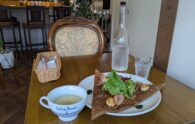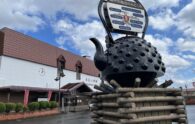For reasons that go without saying, public health has been on my mind a lot these days. I’ve been thinking about Japan’s response to this situation and the cultural factors that contributed to it. As I thought, three incidents from my time working as a teacher came to mind.
A few months after first coming to Japan, I was informed I would receive a vaguely defined “employee health check.” On heading into the meeting hall I was directed to, I was shocked to see many of my fellow coworkers and co-teachers receiving all kinds of tests, spread all throughout the large room, sometimes with only a clinical blue curtain for privacy. I stumbled through getting my blood drawn, measurements taken, receiving an ECG, and more in halting Japanese, all with my coworkers doing the same thing just a few feet away. I wondered how I – or anyone – could possibly get used to receiving something as private as healthcare in the company of one’s coworkers. To be honest, it felt a little invasive.
However, a few months after that, I started to understand. One day, class was cut short so students could get a checkup. As they filed out of the classroom to the school nurse’s office, with a start I realized that, in fact, my “invasive” health check totally made sense. It wasn’t about destroying privacy; rather, just like the students, we were a group so our health was checked as a group. Of course – if a single student is sick, it affects the whole class. No matter my individual decisions, my health would always be influenced by those around me, and vice versa.
A few months later still, the picture got even clearer. I had caught influenza, and while languishing at home, I heard a knock on the door. It was a co-teacher, with something to eat and sincere inquiries about my health. Rather than feeling annoyed at the intrusion, my own reaction surprised me: I was grateful for the care this showed. After all, I was a part of the school system. If I was sick, the system was sick.
When I was looking at a chart that seemed to show the relatively slow growth of covid-19 in Japan, and wondering why this could be the case, these incidents came to mind. Of course, I’m not an expert. Everything could completely transform in a day. However, I tend to think that teaching children to think of health as a group endeavor – you can’t just worry about yourself, what matters is the whole group’s health – has an impact on society, when those children grow up. This could make managing a pandemic a bit easier: there’s a head start, so to speak.
As of this writing, Iwate has no cases, but even so, there’s a vague tension in the air, like people are bracing for impact. Hand sanitizer is everywhere, as well as reminders about proper hygiene and posters about coughing etiquette. Supermarkets have announcements describing their measures for sanitizing the store. As usual, many people wear masks, though they are harder to come by these days.
Many events around the country have been scaled back, postponed, or canceled, and Oshu is not an exception. One example is the Hitaka Hibuse Festival in late April. A festival dating back 300 years and an intangible cultural property of Iwate, the Hitaka Hibuse Festival has roots as a celebration to prevent fires in the community. It features brilliant, colorful hayashi-yatai floats with performers playing traditional Japanese music, creating a dreamlike atmosphere.
Maesawa Spring Festival has also been canceled. This street festival features dance performances from 42 and 25-year-olds about to experience yakudoshi (an unlucky year.) As someone who only came to Oshu in October last year, these signature festivals were things I was strongly looking forward to during my first spring in Oshu.
Everything is very unsure right now, but I’m trying to think of this as a group effort: even as we’re apart physically, we’re together psychologically. As much pain and fear that’s gripped the world in the past few weeks – it’s still hard to believe it’s been such a short time – there’s also been humor and hope. From videos of music from the balconies of Italian homes, to stories of Americans helping each other get supplies at the supermarket, to people around the world helping each other in truly countless ways, it’s been heartening to see people working together. Meanwhile I’ve been trying to practice gratitude; even though it’s not always easy, I know I’ve been lucky in innumerable ways.
I’d like to close with my favorite story of solidarity from this pandemic. In the early days, Japan gave China masks and other medical supplies with a note on the boxes: 山川異域 風月同天、a line from a Chinese poem meaning “our lands are different, but we have the same sky.” Later, China sent supplies to Italy, with a classical Roman poem. It read “siamo onde dello stesso mare: we are waves from the same sea.”
Japanese
新型コロナウイルス感染症と岩手県の公衆衛生公衆衛生に関することが頭から離れません。最近の報道を見て、日本とアメリカとの文化的な違いを考えていると、数年前に英語講師として中学校で働いたときの出来事が頭に浮かんできました。
日本で働き始めて数か月後、職員向けの「健康診断」がありました。会場の講堂に入るやいなや、大変なショックを受けました。広い会場にたくさんの同僚が集まり、様々な検査を受けていましたが、プライバシーを守る手立ては、持ち運びができるブルーカーテン4枚だけだったからです。血液検査や身長と体重の測定などを受けている最中、同僚はすぐ近くで同じ検査を受けているという状況でした。医療に関することは、最もプライバシーが尊重されるべきと思っていました。なぜ健康診断を同僚と一緒にすることができるのか分からず、正直、うんざりしました。
ちなみにアメリカでは、対象者を一同に集めた形での健康診断はあまり行われません。任意の日に、かかりつけ医で健康診断するのが一般的です。このような習慣の違いもうんざりする気持ちに拍車をかけたのかもしれません。
しかし数か月後、生徒の健康診断があったとき、日本文化の考え方が分かったような気がしました。そのきっかけは、「みなさん、健康を守りましょう」というような、集団へ向けたメッセージでした。生徒が一人でも病気になったら、他の生徒に大なり小なり影響を与えますし、逆もまた同様です。日本の健康診断のやり方は、一人ひとりのプライバシーを害するものではなく、集団をあたかも一つの個体としてとらえ、健康状態を確認しようとする考えが根底にあるように感じました。
さらにその数か月後、私はインフルエンザにかかりました。家でぐったりとしていたとき、同僚の英語の先生が来てくれました。具合を心配してくれ、食べ物を持ってきてくれたのです。医療や体調に関することは、プライバシーの面から、他人に言うことではないと思っていましたが、この時、同僚の親切さ・思いやりにとても感謝しました。結局のところ、私は学校という集団の一員であり、私が病気になれば、その集団も健康な状態を失うと感じました。
この原稿を書いている3月下旬の時点で、日本の新型コロナウイルスの感染者数が比較的少ないことを見て、中学校で働いていたときの出来事を思い出しました。私は専門家ではありませんが、子どもの頃から集団の健康という考え方を教えたら、~それは例えば、自分のことだけ考えるのではなく、みんなのことも大切にする、というような考え方~大人になったときに社会全体に影響を与えるでしょう。このことは、感染予防の点でアドバンテージがあるのかもしれない、ということを感じました。
3月下旬時点で、岩手県内での感染者は確認されておりませんが、緊迫した空気を感じます。消毒用アルコール、手洗いの仕方や・咳エチケットのポスターなどをあちこちで見ますし、店舗ではウイルス感染対策の取り組みを公表しています。全国的にそうであるように、岩手県でもマスクを買うのが難しくなりました。
全国的にイベントは縮小、延期、または中止されておりますが、奥州市も例外ではありません。例年4月下旬に開催される日高火防祭りはその一つの例です。300年の歴史を持つ無形文化遺産の祭りで、由来は火防祈願の祭りです。日本の伝統的な音楽の奏者がきらびやかな囃子屋台に乗り、夢想的・幻想的な雰囲気を醸し出します。奥州前沢春まつりも中止されました。このストリートフェスティバルでは42歳と25歳の厄年連の踊りが見どころです。昨年秋に奥州市に住み始めた私にとって、初めての春、この二つの祭りはとても楽しみにしていました。
コロナウイルスがいつ終息するか分かりませんが、世界中の皆さんが手をとりあい、心を一つにし、この困難を乗り切ろうとしています。わずかな期間のうちに、世界が痛みや恐怖に包まれていますが、希望もあります。イタリアでのベランダからの音楽演奏の動画、アメリカでのお年寄りの代わりにスーパーに買い物に行く人の話、世界中で多くの方々が助け合っていることを見ると本当に感動します。たとえ苦しくても、恵まれていることはたくさんあるでしょうから、私は感謝し続けたいです。
結びに、思いやりの話で一番好きなものをご紹介します。
日本は中国にマスクなどの医療品を送った際、中国の詩を箱に書きました。「山川異域 風月同天」(陸地は違うけど、空は同じ)。
その後、中国はイタリアへ医療品を送った際、ローマの詩を箱に書きました「siamo onde dello stesso mare」(私たちは同じ海からの波だ)。



